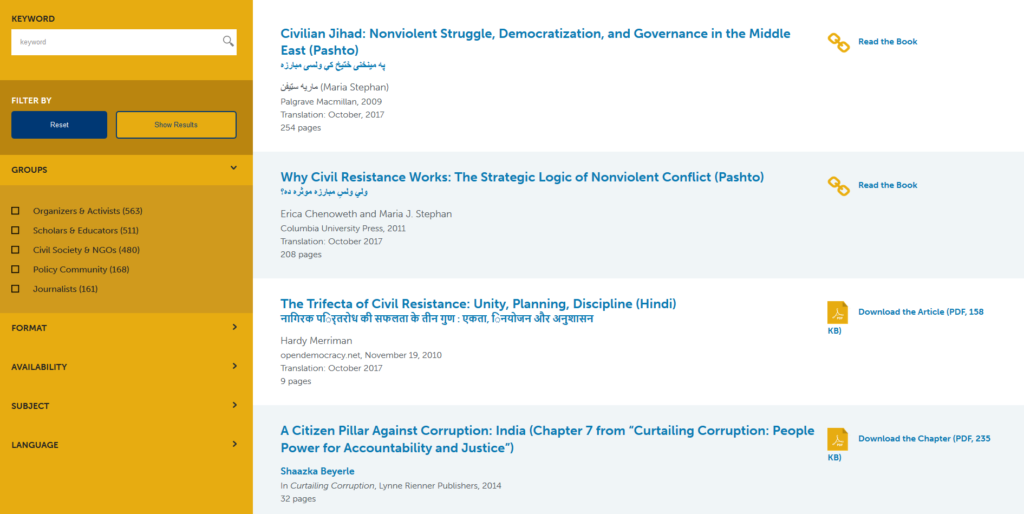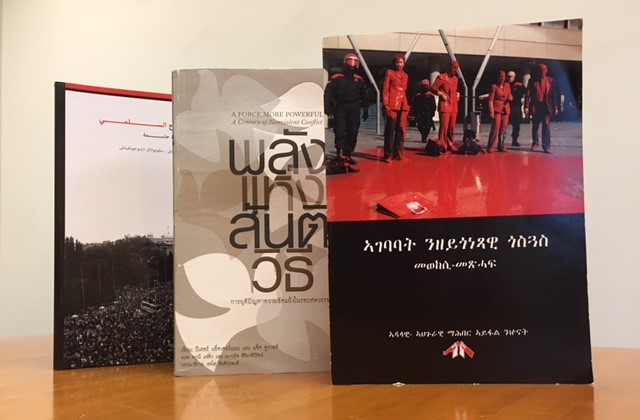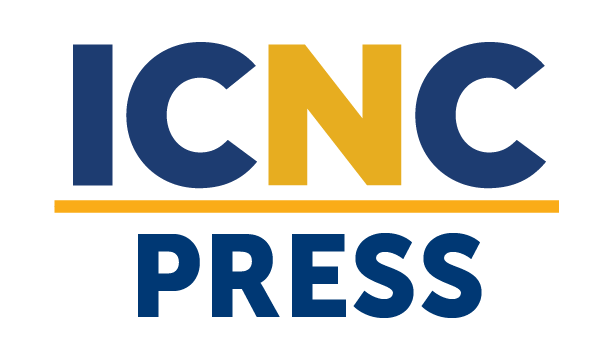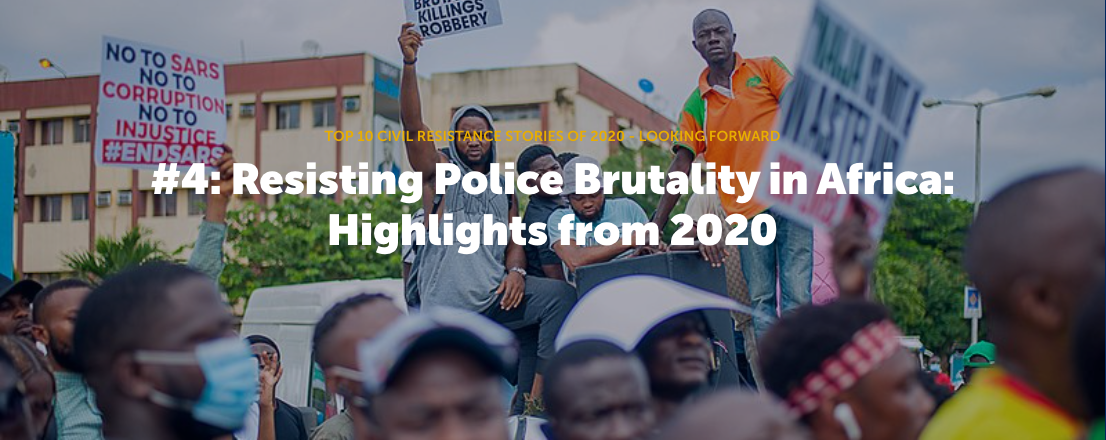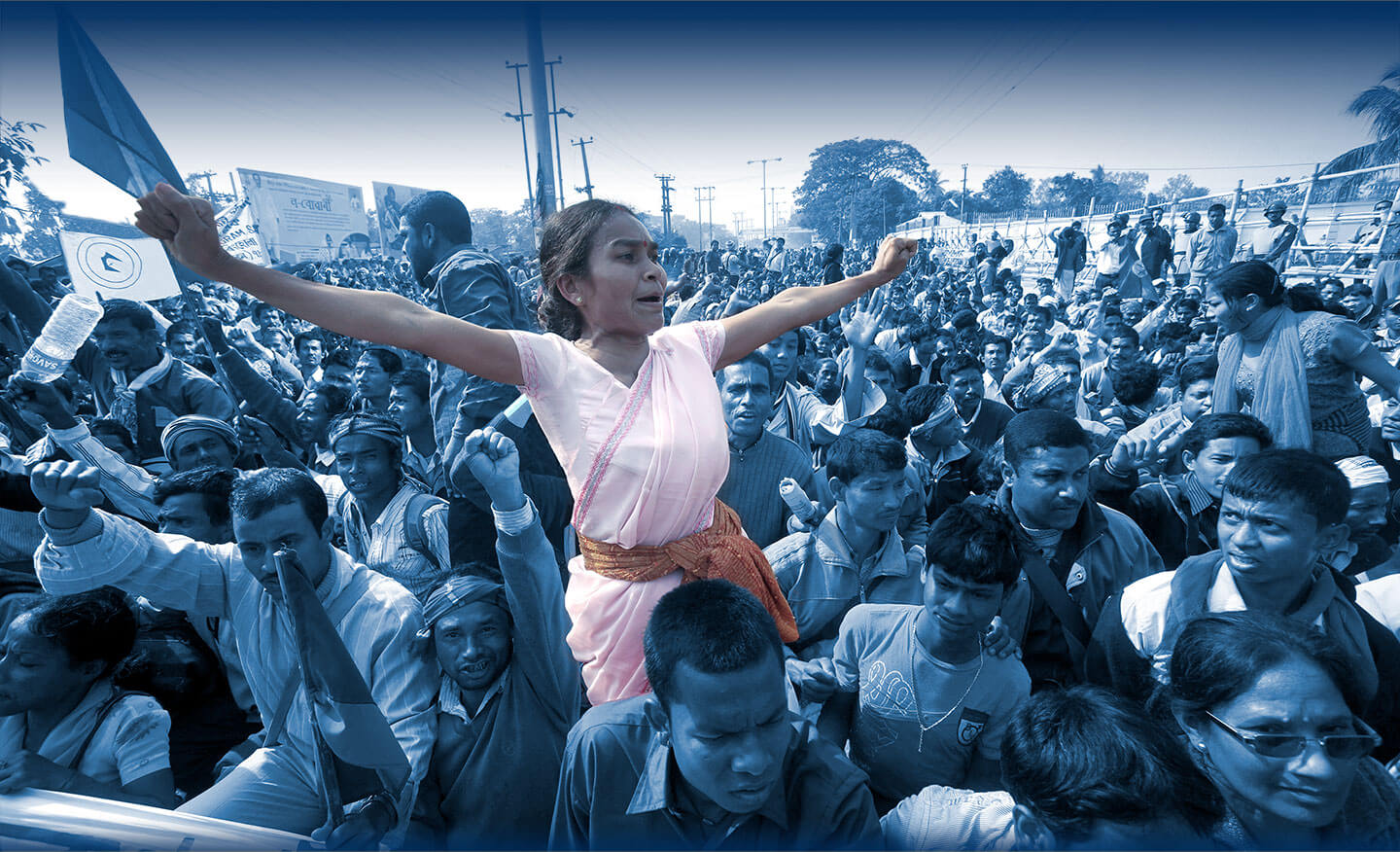

-
What's New
New blog post
This blog is the ninth in a series addressing the Top 10 civil resistance stories of 2020.
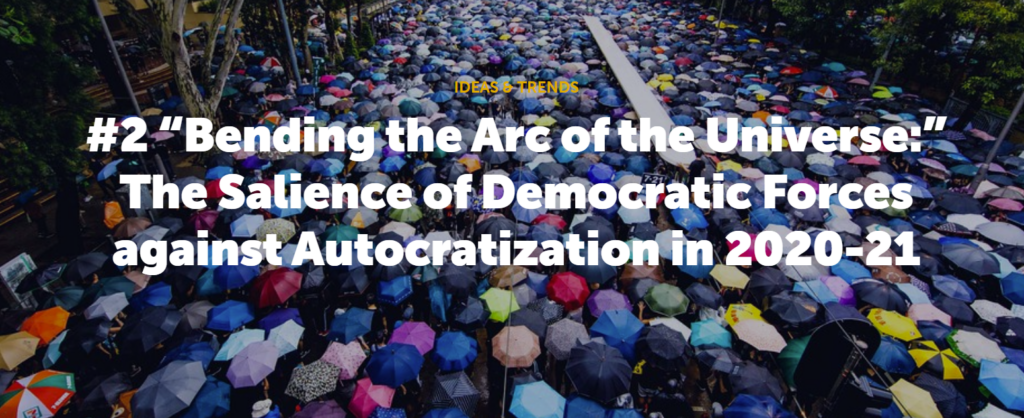
Minds of the Movement co-editor Maciej Bartkowski writes:
In the past two decades, autocracies have been on the rise and aspiring autocrats in democracies have been gaining in numbers and strength. The 2020 democracy report by the V-Dem (Varieties of Democracy) Institute noted that by 2020, autocracies have formed a clear majority for the first time since the beginning of 2000, constituting 92 countries with 54% of the global population or 4.2 billion people. Furthermore, 35% of the world’s population, an additional 2.7 billion people, live today in countries that are experiencing a significant decline in their democracy index and that are often headed by elected anti-democratic demagogues.
This is colloquially known as the third wave of authoritarianism, or “autocratization” as a pun to Samuel Huntington’s thesis articulated in 1991 on the three waves of democratization. If we consider relatively static elements of democracy such as respect for human rights, free and fair elections, and democratic rule of law inclusive of minorities…
Read more! -
Apply now to ICNC’s 2021 Participant-Led Online Course on Civil Resistance
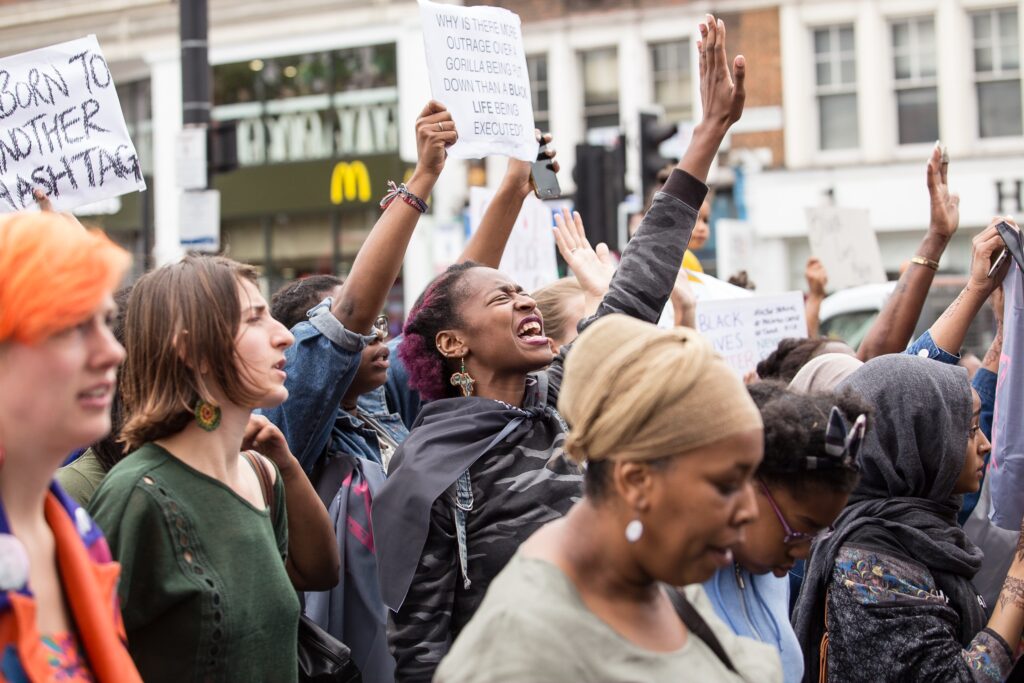
This participant-led course is designed by ICNC as a cohort-based course where the accepted participants work together as a collaborative learning community with some technical assistance from ICNC, but without instructors’ moderation or comments on participant discussions. Participants in this course will work together with other participants effectively, and help each other build a strong and motivated learning community.
We encourage any movement activists, organizers, scholars, educators, members of civil society, policy professionals, and journalists to apply to take this course—if you think the course will help you participate in, support, or analyze nonviolent peoples’ movements for human rights, political freedom, social justice, and environmental sustainability more effectively.
Course dates: March 4, 2021 – April 22, 2021
Application Deadline Extended: Monday, February 15, 2021 by Midnight EST
Learn more! -
‘TEN YEARS ON’
Activist Ahmed Maher Reflects on the Historic Egyptian Revolution

Ten years on…
“Lost in the alleys of El-Mohandessin and the streets of Bolak El-Dakrour are our lived memories of 2011. The 18 days of revolution that were filled with stories—stories about protests; stories about torture; stories about demands, plans, and goals; stories about mobilization, resistance, unity, resilience. But above all, those 18 days were filled with hope.”
So begins this excerpt from a forthcoming memoir by Ahmed Maher, co-founder of Egypt’s April 6 Youth Movement that helped mobilize the Egyptian Revolution of 2011 – massive protests against police brutality in Egypt that culminated in the ouster of President Hosni Mubarak. The uprising began on January 25, 2011.
Having been detained for his activism, Maher is an icon of nonviolent resistance. ICNC is proud to exclusively present this excerpt, which Maher penned to commemorate the 10th anniversary of the “Egyptian Arab Spring.”
New blog post
This blog is the ninth in a series addressing the Top 10 civil resistance stories of 2020.

Minds of the Movement co-editor Maciej Bartkowski writes:
In the past two decades, autocracies have been on the rise and aspiring autocrats in democracies have been gaining in numbers and strength. The 2020 democracy report by the V-Dem (Varieties of Democracy) Institute noted that by 2020, autocracies have formed a clear majority for the first time since the beginning of 2000, constituting 92 countries with 54% of the global population or 4.2 billion people. Furthermore, 35% of the world’s population, an additional 2.7 billion people, live today in countries that are experiencing a significant decline in their democracy index and that are often headed by elected anti-democratic demagogues.
This is colloquially known as the third wave of authoritarianism, or “autocratization” as a pun to Samuel Huntington’s thesis articulated in 1991 on the three waves of democratization. If we consider relatively static elements of democracy such as respect for human rights, free and fair elections, and democratic rule of law inclusive of minorities, Huntington’s third wave of democratization that began in 1974 slowed down in the second half of the 1990s and eventually died down by the beginning of 2000. […]
-
ICNC, ASIL Team Up For Groundbreaking Series
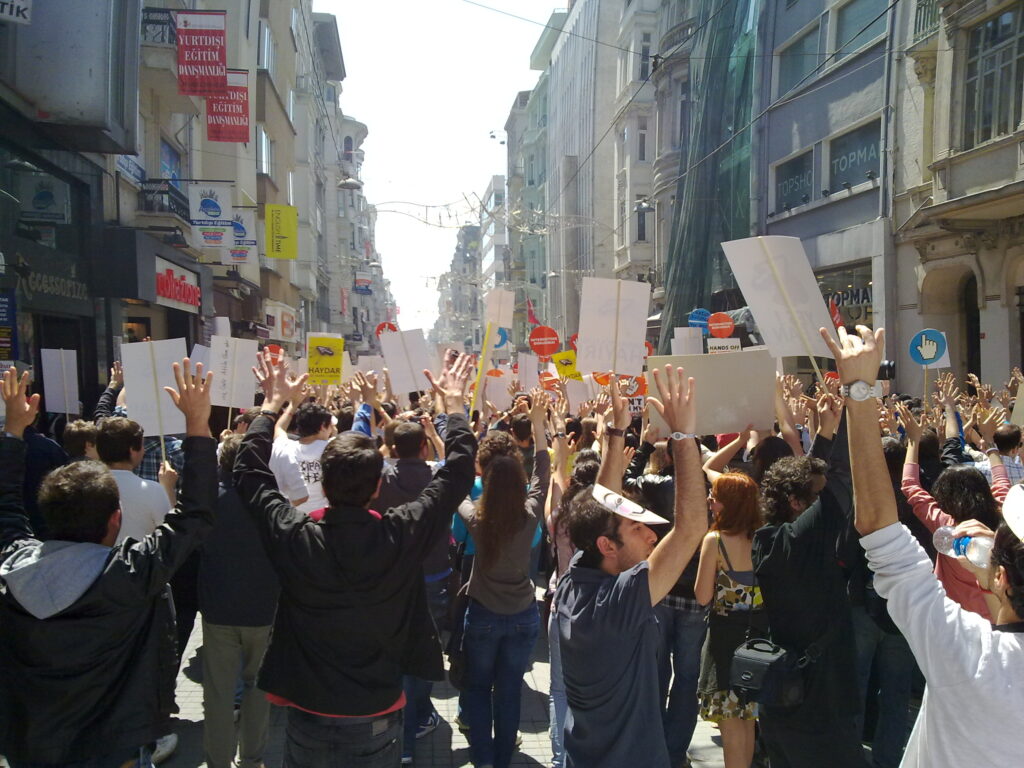
In a groundbreaking collaboration, ICNC and the American Society of International Law (ASIL) recently hosted a series of events focusing on the intersection of civil resistance and international law. Topics included how civil resistance movements can receive international support, as well as how popular nonviolent movements contribute to the development of international law.
The events featured expert panelists, including scholars, movement leaders, and members of the policy community.
o Wednesday, January 13, 2021: Nonviolent Movements for Democracy and Human Rights: The Call from the Front Lines—What’s Our Response?
o Wednesday, January 27, 2021: Nonviolent Civil Resistance: Implications for International Law & Law-making.
o Wednesday, February 3, 2021: External Support to Democracy and Human Rights Movements: Proposing a Doctrine of a Right to Assist.
-
For Activists & Organizers
ICNC provides practical, relevant information and educational opportunities about civil resistance to activists and organizers around the world.
Our view is that nonviolent struggle is a social science that can be studied and understood. Practitioners can increase their chances of success by learning lessons from each other as well as from cutting edge academic scholarship on this topic.
Learn More -
New from ICNC Press
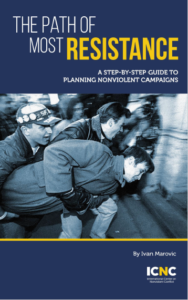 The Path of Most Resistance: A Step-by-Step Guide to Planning Nonviolent Campaigns by Ivan Marovic, is a practical guide for activists and organizers of all levels, who wish to grow their resistance activities into a more strategic, fixed-term campaign. It guides readers through the campaign planning process, breaking it down into several steps and providing tools and exercises for each step. Upon finishing the book, readers will have what they need to guide their peers through the process of planning a campaign. This process, as laid out in the guide, is estimated to take about 12 hours from start to finish.
The Path of Most Resistance: A Step-by-Step Guide to Planning Nonviolent Campaigns by Ivan Marovic, is a practical guide for activists and organizers of all levels, who wish to grow their resistance activities into a more strategic, fixed-term campaign. It guides readers through the campaign planning process, breaking it down into several steps and providing tools and exercises for each step. Upon finishing the book, readers will have what they need to guide their peers through the process of planning a campaign. This process, as laid out in the guide, is estimated to take about 12 hours from start to finish.It is available for purchase or free download in English, Spanish, Catalan and Portuguese (Brazilian).
Learn More -
Visit our full resource library to find hundreds of resources on civil resistance in English and over 70 languages.
Or, if you are interested in civil resistance and don’t know where to start, we’ve made a list of general introductory resources–many of them short articles–to introduce you to the field. See our list of ten key resources for activists and organizers.
Visit the Resource Library -
ICNC Translations Program
Translating civil resistance literature into diverse languages is one of the most powerful ways to spread knowledge and increase the effectiveness of nonviolent movements struggling for rights, freedom, and justice. Learn more about our translations program.
We also currently host resources on civil resistance in over 70 languages and dialects on our website.
Find Translated Resources
-
For Scholars & Students
The discipline of civil resistance has developed enormously in recent years, driven by new quantitative and qualitative scholarly research, as well as by numerous nonviolent movements around the world.
ICNC runs a number of grant-supported academic and educational programs to meet the growing demand for cutting edge research, applied knowledge and practical skills in this field. Look at our research, writing, teaching and other educational offerings and review current calls for proposals or applications.
Learn More -
Academic Online Curriculum
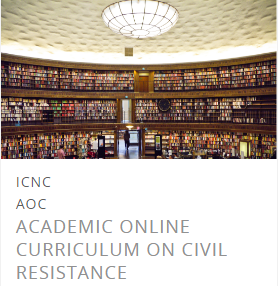 ICNC’s Academic Online Curriculum on Civil Resistance (AOC) is an online resource to advance curriculum development, teaching, and research on civil resistance. It offers an extensive and regularly updated set of resources in this field, organized into clearly structured topics and case studies, and drawn in part from content that we and various academic collaborators developed for the ICNC university seminars we’ve led since 2009.
ICNC’s Academic Online Curriculum on Civil Resistance (AOC) is an online resource to advance curriculum development, teaching, and research on civil resistance. It offers an extensive and regularly updated set of resources in this field, organized into clearly structured topics and case studies, and drawn in part from content that we and various academic collaborators developed for the ICNC university seminars we’ve led since 2009.Anyone can register to use the AOC at any time and it is free to use.
Topics on the AOC include:
– Civil Resistance: Nature, Ideas and History
– Strategic Considerations in Civil Resistance Struggles
– Types of Civil Resistance StrugglesAnd more!
Register now! -
Calls from ICNC Academic Initiatives
 Throughout the year, ICNC is offering a number of academic opportunities, resources, and support that it makes available to scholars and students. The field of civil resistance has grown immensely and these academic programs aim to respond to the growing demand for knowledge and skills and contribute to expanding the quality of education, research, and curriculum related to civil resistance. This page includes the current and past calls for the ICNC’s educational and research programs, such as learning opportunities, curriculum support, and research grants.
Throughout the year, ICNC is offering a number of academic opportunities, resources, and support that it makes available to scholars and students. The field of civil resistance has grown immensely and these academic programs aim to respond to the growing demand for knowledge and skills and contribute to expanding the quality of education, research, and curriculum related to civil resistance. This page includes the current and past calls for the ICNC’s educational and research programs, such as learning opportunities, curriculum support, and research grants.One of our calls, the Rapid Field Research and Data Collection Program, accepts applications on a rolling basis and interested applicants can apply for the program throughout the year.
Learn More -
New from ICNC Press:
 Preventing Mass Atrocities: From a Responsibility to Protect (RtoP) to a Right to Assist (RtoA) Campaigns of Civil Resistance
Preventing Mass Atrocities: From a Responsibility to Protect (RtoP) to a Right to Assist (RtoA) Campaigns of Civil Resistance
by Peter Ackerman and Hardy Merriman
Available in: English, Arabic, and SpanishEvents of the last decade demand new approaches to atrocity prevention that are adaptable, innovative and independent of a state-centered doctrine. With the aim of reducing risk factors such as civil war, we argue for a new normative framework called The Right to Assist (RtoA)….
See ICNC Press Publications
-
For the Policy Community
Civil resistance movements have a proven role in advancing human rights, democratic governance, and curtailing corruption. They are a critical factor in addressing root causes of human suffering and reducing deadly violence in the world.
It is incumbent for members of the policy community who care about these issues to understand how movements work; their historic record of making change; and when, how, and under what circumstances external actors can take actions that are helpful to movements.
Learn More -
New From ICNC Press:
 Preventing Mass Atrocities: From a Responsbility to Protect (RtoP) to a Right to Assist (RtoA) Campaigns of Civil Resistance
Preventing Mass Atrocities: From a Responsbility to Protect (RtoP) to a Right to Assist (RtoA) Campaigns of Civil Resistance
by Peter Ackerman and Hardy Merriman
Available in: English, Arabic, and SpanishEvents of the last decade demand new approaches to atrocity prevention that are adaptable, innovative and independent of a state-centered doctrine. With the aim of reducing risk factors such as civil war, we argue for a new normative framework called The Right to Assist (RtoA)….
Read More -
Powering to Peace: Integrated Civil Resistance and Peacebuilding Strategies
by Veronique Dudouet
Learn More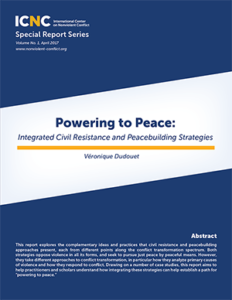 This report explores the complementary ideas and practices that civil resistance and peacebuilding approaches present, each from different points along the conflict transformation spectrum. Both strategies oppose violence in all its forms, and seek to pursue just peace by peaceful means. However, they take different approaches to conflict transformation, in particular how they analyze primary causes of violence and how they respond to conflict. Drawing on a number of case studies, this report aims to help practitioners and scholars understand how integrating these strategies can help establish a path for “powering to peace.”
This report explores the complementary ideas and practices that civil resistance and peacebuilding approaches present, each from different points along the conflict transformation spectrum. Both strategies oppose violence in all its forms, and seek to pursue just peace by peaceful means. However, they take different approaches to conflict transformation, in particular how they analyze primary causes of violence and how they respond to conflict. Drawing on a number of case studies, this report aims to help practitioners and scholars understand how integrating these strategies can help establish a path for “powering to peace.” -
A Movement-centered Support Model: Consideration for Human Rights Funders and Organizations
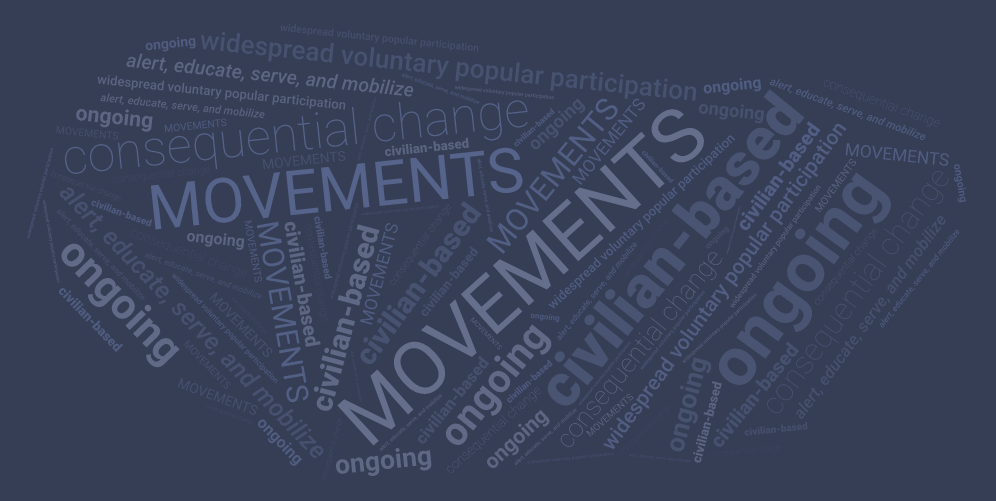
ICNC President Hardy Merriman writes: “What makes civil resistance movements effective? If funders and human rights organizations can identify key factors that answer this question, then their efforts can be oriented towards trying to support the development and growth of those factors. […]”
Learn More
-
Minds of the Movement Blog
Minds of the Movement is a blog for those interested in the ideas and experiences of people on the front line of civil resistance, and those who seek to understand the art and science of nonviolent struggle.
Learn More -
NEW COUNTDOWN SERIES
Read now!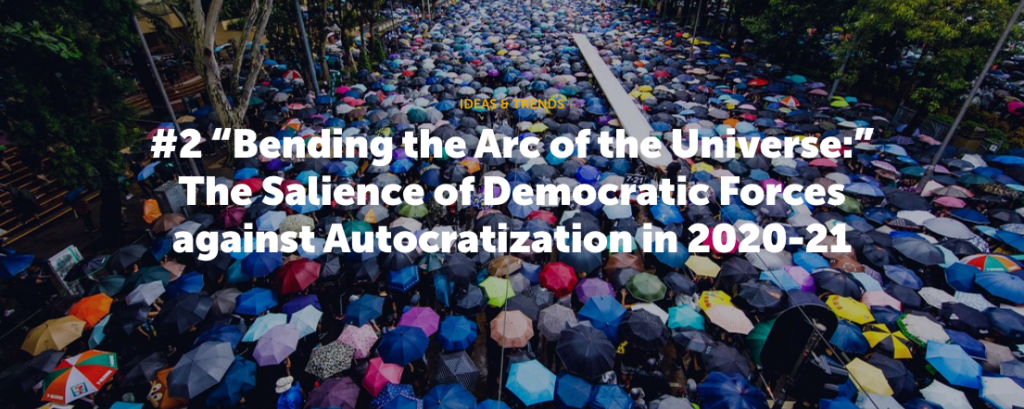
Maciej Bartkowski writes: “In the past two decades, autocracies have been on the rise and aspiring autocrats in democracies have been gaining in numbers and strength. The 2020 democracy report by the V-Dem (Varieties of Democracy) Institute noted that by 2020, autocracies have formed a clear majority for the first time since the beginning of 2000, constituting 92 countries with 54% of the global population or 4.2 billion people. Furthermore, 35% of the world’s population, an additional 2.7 billion people, live today in countries that are experiencing a significant decline in their democracy index and that are often headed by elected anti-democratic demagogues. This is colloquially known as the third wave of authoritarianism, or “autocratization” […]” -
Read now!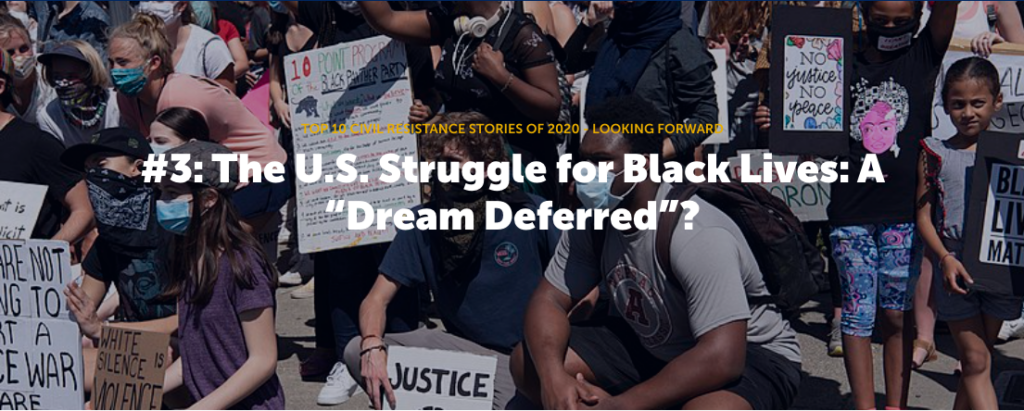
Rev. Tremaine Combs writes: “With the deaths of George Floyd, Breonna Taylor, and Ahmaud Arbery, 2020 has seen a swell in support, prioritization, and even vitriol regarding the movement to cement in the public consciousness that Black Lives Matter. Although it has undergone numerous iterations since the first enslaved Africans were brought to the United States in the early 1600s, the modern movement for Black lives as it exists in 2020 has its roots in the 2012 death of Trayvon Martin in Florida. It then picked up steam with the uprising in Ferguson, Missouri after the death of Michael Brown in 2014. Some distinguishable trends, as well as challenges, set the movement apart from its antecedents. […]” -
Phil Wilmot writes: “Abdourahman embarked on self-study of the strategy of nonviolent action in a repressive climate. He had just served four years in prison for participating in an opposition coalition meeting for which he was serving as secretary general at the time. Simply by typing “how to bring down a dictatorship without violence” into a search engine, he discovered some key texts on nonviolent resistance that had been translated into French and made available free of charge on the websites of CANVAS, ICNC, and other educational organizations. […]”
Read now!

